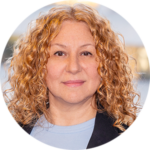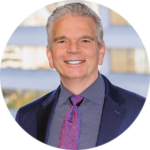Saint Sophia Cathedral in Kyiv, Ukraine. Photo credit: Igor Dashevskiy
Ukraine
There are insights and a level of understanding that are possible only through living and working among the people of Ukraine, experiences that cannot be taught, learned by following social media, or viewing images that dominate the news.
With 30 years’ experience in the area, and with leaders who grew up in Ukraine, lived and worked in the country, and are Ukraine natives, URC has powerful ties to the people, and a deep understanding of the institutions and culture of the country.
As former officials with USAID and representatives of private-sector companies, URC leaders’ experiences in Ukraine bring a unique and deep perspective on the challenges Ukrainians face as they look to rebuild and improve the systems and processes that deliver health care services across the country.
Strengthening Health Systems and Service Delivery
People-centered care combined with a continuous health care quality improvement process create a powerful dynamic that empowers frontline health care workers to strengthen health systems with fact-based conviction. URC is committed to creating a system as resilient as the Ukrainian people.
An unwavering commitment to strengthening access to quality health care services is a fundamental value at URC. It has driven URC for decades across the globe, fighting infectious diseases, improving health outcomes, and transforming health service delivery systems.
Ensuring high-quality health care services is paramount. URC has more than four decades of experience supporting countries’ efforts to strengthen delivery of quality health services.
Achieving and sustaining quality health systems requires change. Poor quality care is a system-wide problem that must be addressed through a whole-system approach to ensure effective, equitable, transparent, and efficient delivery of quality health services. Engagement and participation throughout the health system and from civil society, patient organizations, the private sector, community stakeholders, and sectors beyond health such as education, employment, and communications, are critical to achieving quality health systems.
URC builds on country-defined goals and existing systems to support leaders, policymakers, and program managers to implement quality strategies and promote coordination and harmonization of high-quality tools and approaches across the health sector.
URC’s leadership in strengthening health systems and quality improvement has supported health programming in 60 countries.
Continuous Quality Improvement
The foundation for this work starts with URC’s expertise in applying continuous quality improvement (CQI) to build and sustain a quality health system at the national, subnational, district, facility, and community levels.
URC has a 40-year history of strengthening national quality improvement and quality assurance programs in countries like Afghanistan and Jordan, and in Zika-affected regions in the Caribbean and Latin America. Essential elements of quality services in these settings include quick mobilization, access and infrastructure, frontline clinical care, patient safety, community engagement, and promoting resilient systems.
The emphasis is on “continuous,” developing a system that provides insights from data collected at every level and every step, allowing real-time decision-making to address challenges. CQI includes leadership and governance, management of financial and physical resources, intentional learning to improve quality of care, and systems for measurement, accountability, and data use.
URC has seen remarkable, proven successes in countries where CQI was implemented, most notably in Jordan through the Health Services Quality Accelerator, a 5-year USAID program to accelerate improvements in health outcomes through the public and private sectors:
- Established Quality Assurance and Patient Safety teams at 153 health facilities to improve the quality of services.
- Introduced a Point-of-Care CQI improvement model to support more than 300 initiatives at health centers.
- Supported Jordan’s Ministry of Health’s efforts to enhance the country’s health care policy environment.
- Developed an accountability system for health care provider performance and business continuity plans during emergencies or crises.
URC’s global projects, including the USAID Quality Assurance Projects (QAP) I, II, and III, Health Care Improvement (HCI) Project, and Applying Science to Strengthen and Improve Systems (ASSIST) Project, have conducted global and country-specific activities to support QI initiatives in the region, including Russia, Georgia, and Ukraine. These projects improved the quality of health services, strengthened care coordination across the health care delivery system, and institutionalized evidence-based best practices in service delivery.
Learn more about URC’s work in Health Systems Strengthening and Service Delivery and Continuous Quality Improvement.
Our People in Ukraine

Inna Sacci
Inna Sacci brings more than two decades of international public health experience to her role as Senior Vice President of the Asia-Middle East-Europe-North Africa region at URC. With a deep-rooted commitment to improving health care systems, Inna has dedicated her career to fostering positive change, including in her native Ukraine.
Inna is regarded as a technical expert in areas that include social behavior change, continuous quality improvement, and health systems strengthening. She previously worked in Ukraine, providing guidance to health officials during the initial stages of COVID-19, leveraging her expertise in health system strengthening to enhance supply chain management and response strategies.
In her previous role as Chief of Party for a USAID project in the Philippines, Inna spearheaded collaborative efforts with governmental bodies, civil society organizations, and the private sector. Her leadership and project management ensured the successful introduction, promotion, and sustainability of social and behavioral change interventions aimed at improving health care outcomes.
Inna was instrumental in driving the National Obstetrical Care Certificate in Armenia, increasing government reimbursement for maternal health services, promoting early antenatal care, and fostering competition among health facilities to elevate standards of care while combating corruption in healthcare.
Inna is a Ukrainian-American who speaks Ukrainian, Russian and English, and remains committed to returning to Ukraine to help improve the way health care services are designed and delivered.

Oleksander Cherkas
A native Ukrainian, Oleksander Cherkas has dedicated 35 years of his career to improving the lives of Ukrainians, including 15 years working with international organizations, and more than 14 years with U.S. government agencies, including 12 years as team leader at USAID’s Regional Mission for Ukraine, Belarus, and Moldova.
While with USAID, Oleksander co-designed and managed the Health Policy Initiative, the mission’s flagship health policy reform project, working with the Ministry of Health, government agencies, and NGOs to build and strengthen programs that focused on family planning, HIV/AIDS, AI and TB.
His work with the agency also included managing the Families for Children Program in Ukraine, addressing the needs of orphans and vulnerable children; HIV/AIDS Service Capacity project, Reducing the Stigma and Discrimination Associated with HIV Infection and AIDS Program in Ukraine, HIV Data Triangulation project and other activities.
Oleksander previously held various roles for the U.S. Embassy in Kigali, Rwanda, including PEPFAR Strategic Information Liaison Advisor, and managing projects focused on refugees, and Population, Health and Nutrition Officer at USAID Mission for Eastern and Southern Caribbean and the U.S. Embassy in Georgetown, Guyana.
He has worked at the national, regional and international levels in Eurasia, Africa, North America, South America, and the Caribbean.

Earl Gast
Earl Gast is president of URC, overseeing and directing the company’s strategic business plan and development, project and program execution, and working collaboratively across the organization and with partners, stakeholders, clients and donors to deliver business results.
Earl brings more than 30 years of international development experience, including two separate executive positions in Ukraine with USAID, managing multi-million-dollar programs promoting health care, democracy, and social programs. As mission director, he revised the development strategy to integrate programing in key partnership cities in eastern and southern Ukraine, where the benefits of reforms were slower to impact people’s lives.
Prior to joining URC, Earl served as Executive Vice President for Programs at Creative Associates, leading the implementation of all programs across more than 30 countries. He previously served as Senior International Advisor for the global law firm, Covington & Burling, LLP, advising many of the largest U.S. and international companies on investment strategies.
Earl spent more than two decades with USAID, including positions in Ukraine and Africa. As the Assistant Administrator (AA) for the Agency’s Africa Bureau, he directed a $7 billion portfolio, providing programmatic assistance to more than 40 countries, including USAID’s largest health portfolio.
Resources
- Learn more about URC’s work in Europe and Eurasia
- Institutional Roles and Relationships Governing the Quality of Health Care (PDF)


